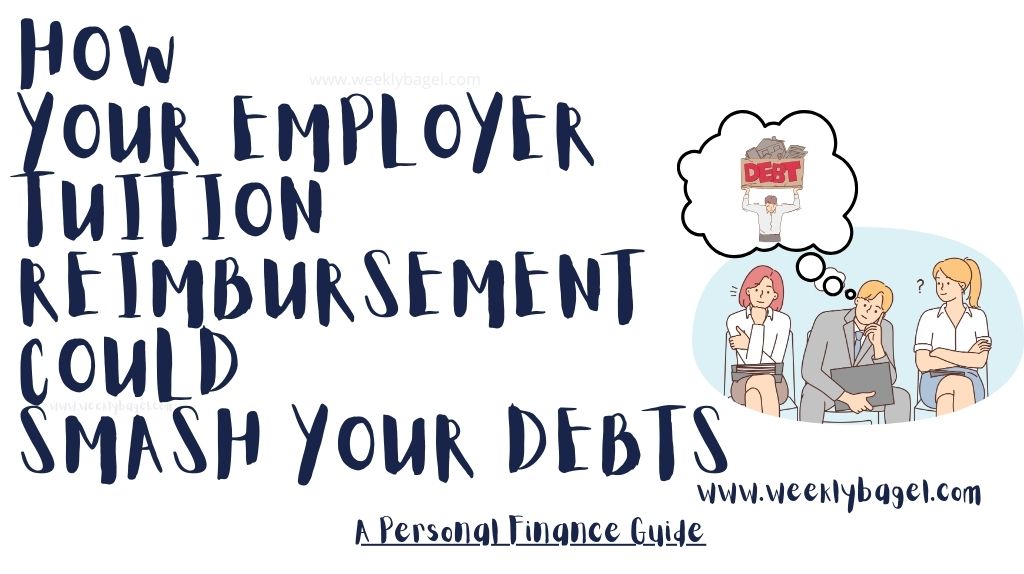
As young working class American adults struggle to find balance between work, life and academics; the threat of increasing student debt towers above the current issues of inflation and rise in cost of living. What most working class adults in schools do not know, is their employers could help relieve the burden of graduating college with a huge student loan debt. Your employer tuition reimbursement program could smash your student debts.
Now, why would a company offer generous tuition reimbursement to you?
Most companies want employee loyalty in order to have a work culture. Without a work culture, companies barely build a solid brand. Besides this reason, your employer wants to retain you in order to continue meeting its annual goals. This is why companies offer generous tuition reimbursements to their employees.
Not all companies do this in the United States, but a majority do it for the above sakes. Also, they get a tax break from the federal government for offering tuition reimbursement to their employees. As a working class adult, I highly recommend you take advantage of it. This is especially, when you are thinking about acquiring new skills that will increase your wage rate.
Let me elaborate.
What Does Tuition Reimbursement Mean In A Job?
Tuition reimbursement in a job means your employer is willing to pay some of your tuition, so you can go to college and not worry about graduating with a huge debt. As previously mentioned, not all employers will offer this to you. However, tuition reimbursement is an example of an employee benefit.
This is why I always recommend young working adults to ask whether an employer plans for your tuition contribution during job interviews. In as much as how scary it may sound, it is within your right. Did you know that, my good reader?
Yes, it is within your right to inquire whether a potential employer could help your lower your student loan debts. You can either ask them about their tuition reimbursement program or a loan repayment plan. Here is the difference between the two below.
| Tuition Reimbursement Program | Loan Repayment Plan |
|---|---|
| You get this every semester or year. | Your employer contributes this to your student loan debt monthly. |
| It comes with a contract. An example is a two year work contract with the company, if it pays 30% of your tuition per year. | It may or may not come with one. Usually, employers with loan repayment plan will contribute certain percentage to your student debt annually as long as you are a current employer. |
| You have to get either A, B or C grade to qualify. | It does not matter. |
Your employee may have one of the above programs to have you stay out of student debt as a working student. Loan repayment plan is often offered by public service. I elaborated more on this on who qualifies for student loan forgiveness after college.
The Pros & Cons Of Employer Tuition Reimbursement
Employer repayment of your tuition sounds good to be true, but it is a fact. Most employers you will work for, will plan to help your college tuition. But, there is a catch to it.
What Are the Cons Of Tuition Reimbursement?
One of the reasons why I do not take tuition reimbursement offered by employer is because it comes with a contract. The con is you may have to work a few more years for the company paying some of your tuition. Personally, I do not like it because I always want to have a choice.
You- my dear reader, may enjoy working for the same company for years. There is nothing wrong with it. It is just that I prefer having a choice to choose from a plethora of income choices. Are you like that too?
If yes, then you may find tuition reimbursement by employers such as mine unattractive. Additionally, reimbursement of tuition by an employer could affect your annual tax credit. An employer reimbursement of tuition may not be considered taxable until it exceeds $5,250 though.
Here is what else to consider.
Companies may actually make you pay back tuition reimbursement. Remember this is not free money, although it is considered an employee benefit. It comes with rules or a contract. When this is broken, it has consequences. Let me reiterate again.
Employers offer tuition assistance as a way of retaining their workforce. If the rules for reimbursement demands you staying for a few years and you break it, you will pay back the money. Hence, why I recommend reading your company’s policy on tuition assistance before engagement.
Is Employer Tuition Reimbursement Worth It?
Employer tuition reimbursement saves you money. When you are a working class adult like me, who uses community college to acquire skills to improve my annual income, you will save a lot annually. You will get up to 30% of your annual tuition paid with this program.
It gives you a chance to use your money to solve other life challenges.
As a working adult, I encourage you work for employers who are willing to offer tuition assistance to you. It is an employer benefit which will make life easy for you, when you decide to receive an education and advance in career or salary. Employer tuition reimbursement is worth it!
How Much Do Most Companies Pay For Tuition Reimbursement?
The IRS limit for tuition reimbursement is $5,250 for each employee. As a result, most companies can pay up to this amount per year as tuition assistance to their employees. This is especially, when what you are studying correlates to the services your company offers.
Here is what I mean, dear reader.
I am currently a certified surgical technologist who assist surgeons during surgeries in seven surgical specialties. My hospital will only reimburse my tuition for classes pertaining to health field. Non-health related classes are not reimbursed. As a nursing student, my HR department will only reimburse me $2500 for RN classes and $4500 for BSN classes.
That is if I choose to ask for it. But, I am paying out of pocket because this reimbursement comes with an additional two year work contract. Do you understand how it works now?
This is why it is important to inquire about employer tuition reimbursement program. Most employers will provide tuition assistance to you. Surprisingly, it is not for free sometimes. It may come with some sort of employer tuition reimbursement rules or contract.
I prefer paying tuition out of pocket. Not because I can afford it, but due to the fact I like choices. This is why I always use community colleges to acquire education to improve my skills and annual income rather than universities. You could read my practical guide to graduate college debt-free.
Does Tuition Reimbursement Count As Income?
Tuition fees paid by an employer on your behalf, is taxable only when it exceeds the IRS limit for tuition reimbursement. The tax free tuition reimbursement limit is $5,250 annually. Any amount above this federal limit for tuition reimbursement is taxable.
To learn more about this, you can read the highlighted question #3 of the IRS FAQs On Tuition Assistance Program.
Why is it important you know about this, my good reader?
Although tuition reimbursement helps a student pay for education, it can impact his or her taxes. When you file your taxes at the end of the year, the tax credit you can claim is affected. This is especially, when your employer reimbursement for tuition exceeds $5,250 IRS limit for tuition assistance.
On the whole, tuition assistance programs are becoming more common. It can either squash your student debt or drastically reduce it before graduation. You just have to consider whether it is great for you. This is because every employer offers it with different policies attached. You have to do is go to your Human Resources department and ask about it.
If you are in nursing school like me, read Graduating Nursing School Completely Debt-Free. It is about resources out there which can help you graduate nursing school with zero debts. You will not even need employer tuition assistance to achieve this goal.




 Can I Send Money From Cash App To Chime Instantly?
Can I Send Money From Cash App To Chime Instantly?